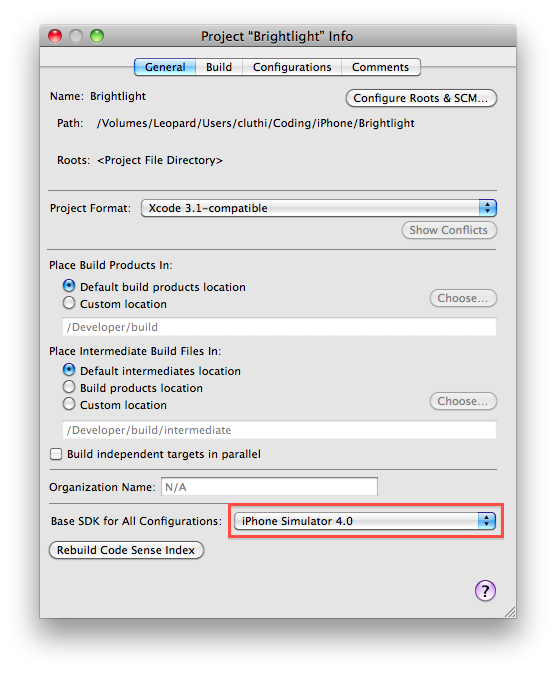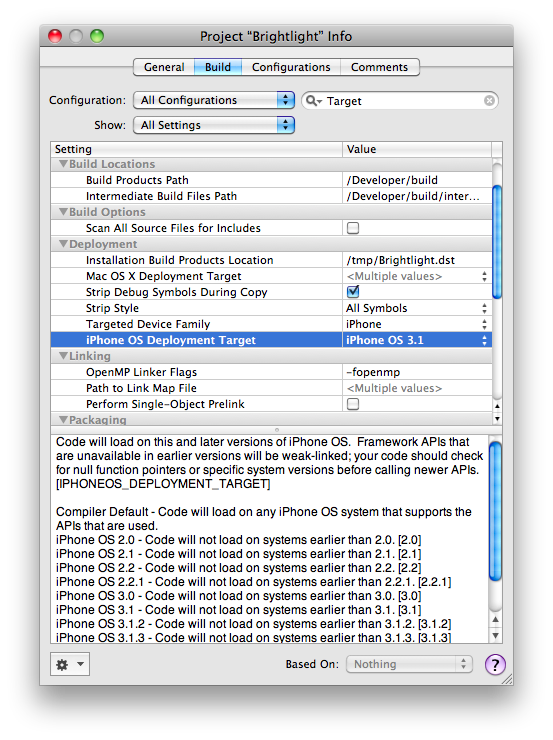UPDATE
This problem is fixed as of Mac OS X 10.8.3+ and iOS 5.1+. I have no idea when it was actually fixed since radar sucks so much.
The problem
From NSMutableURLRequest
setValue:forHTTPHeaderField: documentation:
In keeping with the HTTP RFC, HTTP header field names are case-insensitive.
I see three problems with this.
- Assuming all HTTP implementations are RFC compliant is foolish to say the least.
- Enforcing case-insensitivity is nonsense.
- This bit of documentation is accurate, the case of header fields is actually changed.
Trying this
NSMutableURLRequest *request = [NSMutableURLRequest requestWithURL:[NSURL URLWithString:@"http://www.example.com"]];
[request setValue:@"MyValue" forHTTPHeaderField:@"MyField"];
NSLog(@"result: %@", [request allHTTPHeaderFields]);
outputs
result: {
Myfield = MyValue;
}Notice how the
'F' of
MyField was lowercased, that sucks! If the HTTP server you are trying to communicate with is case-sensitive, you are screwed. I filed
radar #8029516, which is a duplicate of radar #3131623, which means there is almost no chance to have this fixed anytime soon.
When this happens, you should contact the server administrator asking for a case-insensitive implementation. But in the meantime, if you badly need to preserve the case of your headers, read on.
The investigation
First, let's fire
otx to disassemble the Foundation framework in order to have a look at
setValue:forHTTPHeaderField: implementation. I strongly suggest you to use otx version from subversion
trunk, as it is better at resolving symbols in tail call optimizations (fixed in r553).
Excerpt from otx 0.16b:
+18 [...] movl %eax,0x08(%ebp)
+21 [...] leave
+22 [...] jmpl 0x002c52bb
Excerpt from otx trunk:
+18 [...] movl %eax,0x08(%ebp)
+21 [...] leave
+22 [...] jmpl 0x002c52bb _CFURLRequestSetHTTPHeaderFieldValue
Much better, isn't it?
So let's go through the function calls of
setValue:forHTTPHeaderField:. With a basic static analysis of the Foundation and CFNetwork disassemblies, we can draw the following call path:
-[NSMutableURLRequest(NSMutableHTTPURLRequest) setValue:forHTTPHeaderField:]
CFURLRequestSetHTTPHeaderFieldValue()
URLRequest::setHTTPHeaderFieldValue()
HTTPRequest::setHeaderFieldValue()
CFHTTPMessageSetHeaderFieldValue()
HTTPMessage::setHeaderFieldValue()
_CFCapitalizeHeader()
_CFCapitalizeHeader looks like a very good candidate for being the bastard changing the case of our headers. A quick search reveals the
source code of CFNetwork that was open source long time ago. Although the open source implementation does not exactly match what we see in the disassembly (it is now using
toupper instead of
ch + 'A' - 'a' for example), we are now absolutely sure that
_CFCapitalizeHeader is the function responsible for messing with our headers.
Now, let's check is if there is a path that will not call
_CFCapitalizeHeader and if we can somehow influence the condition that would avoid the call to
_CFCapitalizeHeader. This is quickly checked, especially if you enabled the
Separate logical blocks option of otx (-b option for cli).
HTTPMessage::setHeaderFieldValue(__CFString const*, __CFString const*)
+0 000515a4 55 pushl %ebp
+1 000515a5 89e5 movl %esp,%ebp
+3 000515a7 83ec28 subl $0x28,%esp
+6 000515aa 8b4508 movl 0x08(%ebp),%eax
+9 000515ad 8975f8 movl %esi,0xf8(%ebp)
+12 000515b0 8b7510 movl 0x10(%ebp),%esi
+15 000515b3 897dfc movl %edi,0xfc(%ebp)
+18 000515b6 8945f4 movl %eax,0xf4(%ebp)
+21 000515b9 8b450c movl 0x0c(%ebp),%eax
+24 000515bc 890424 movl %eax,(%esp)
+27 000515bf e88a26fbff calll __CFCapitalizeHeader
+32 000515c4 c744240cffffffff movl $0xffffffff,0x0c(%esp)
+40 000515cc 89742408 movl %esi,0x08(%esp)
+44 000515d0 89c7 movl %eax,%edi
We see that there is no path that avoid the call to
_CFCapitalizeHeader. So we are left with the last resort solution: patching
_CFCapitalizeHeader. With
APE Lite, function patching is very easy. You first use
APEFindSymbol() to find the address of a non-exported symbol (i.e.
__CFCapitalizeHeader), then
APEPatchCreate() to replace a function implementation with your own, while still keeping a reference to the original implementation. On iPhone OS, you can use
APE Lite+arm (my implementation of the APE Lite API using MobileSubstrate).
The solution
NSMutableURLRequest+CaseSensitive is a category on NSMutableURLRequest that adds these three methods:
- (void) setAllHTTPHeaderFields:(NSDictionary *)headerFields caseSensitive:(BOOL)caseSensitive;
- (void) setValue:(NSString *)value forHTTPHeaderField:(NSString *)field caseSensitive:(BOOL)caseSensitive;
- (void) addValue:(NSString *)value forHTTPHeaderField:(NSString *)field caseSensitive:(BOOL)caseSensitive;
Just pass
caseSensitive:YES for preserving the case of your header fields.
Warning: you SHOULD NOT use this in production code. But hey, HTTP implementations SHOULD be case-insensitive ;-)







